Caryn Rivadeneira's Blog, page 2
May 31, 2014
I Am One of Them
Years ago, an Emergent Christian radio host teased me about my Reformed-ness on his radio show. The conversation left both of us confused. Him, I’m sure by my claiming Reformed theology took the same holistic approach I saw in the Emerging Church (especially in areas of erasing that line between sacred and secular. We got rid of it long ago…). Me, by how this smart man seemed to know nothing of Reformed theology.
The confusion would continue as I’d read critiques (or worse) on Reform-ed-ness across the internet and wonder who on earth they were talking about. Certainly it couldn’t be the Reformed-folks at my Christian Reformed Church or who’d taught and attended my college. Apparently not, since plenty of these same folks who criticized Reformed preachers and writers would show up at the Calvin College Festival of Faith and Writing and celebrate the greatness of the school, the inclusiveness of the festival, the rightness of the world. And I’d think, Duh. This is how Reformed works!
What I didn’t know then, but do know now is that the radio host and the internet were speaking of “different” kinds of Reformed. A kind I’d come to resent, a kind that would cause me–and others–to claim, “I’m not one of those.”
And I did this right up until last week–when I posted the wonderful (wish-I’d-have-written) “I’m Not Kind of Reformed” and when I nearly stood up and cheered upon reading “So What’s Wrong with Neo-Calvinism” by Bob Robinson (as it appeared at Scot McKnight’s Jesus Creed blog).
Robinson claims that instead of calling themselves “Reformed” or “Neo-Reformed” or “Neo-Calvinist,” this young, restless and reformed set who seem to put God’s rules above his revelations and God’s wrath above his grace should claim “Neo-Puritan” as a more appropriate name. And I concur. I like it. Neo-Puritan tells us that they indeed are Calvinist in nature, but differentiates “them” from the Reformed denominations who seem to view the world and God’s work in it, quite differently than the other Reformed set.
However, what I really liked about Neo-Puritan wasn’t just that it was more accurate. I liked it because it would mean I wouldn’t have to keep saying, “I’m not one of them.”
While my brain slurped up that delicious thought, my heart and soul gagged on it. I think the Holy Spirit had something to do with this. After all, that “I’m not one” of them is a lie. A horrible denial of my identity. Of my family.
Because of course, as long as anyone claims Jesus as Lord, has accepted his gift of grace, I am one of them. No matter how or where they worship–be it in a church, a beach, or a prison–no matter what sins they commit or cover up, if them claim Jesus, I claim them. I am one of them. In Christ.
No matter where they (or you) stand on women preachers, on gay marriage, on gun control, on who can take or administer the sacraments, on what even are the sacraments, on divorce, on drums in church or organ, on bikinis, on dancing or drinking or drug-taking, on confession, on prayer books, on premarital sex, on speaking in tongues, on corporal punishment, on public vs. home vs. Christian school, on whether James was really Jesus’ brother or not, on abortion, on birth control, on infant baptism, on predestination, on the rapture, on confession, or on any of the 100 zillion issues of doctrine or theology or “preference” we disagree on, I am one of them. In Christ.
We don’t need to be unified in all things or even try to agree on all things (the Bible would be a lot clearer on many issues if God wanted it this way). And I’m grateful for denominational and theological differences among believers. I love learning and challenging and being challenged. And I’m grateful that God has allowed his church to grow and reach others in such diverse ways with such diverse views.
But I can’t forget: we are brothers and sisters in Christ. No matter our differences, we are family. Galations 3 makes this clear.
As my actual (by blood and marriage) family will tell you, this means I will not hesitate to push back. I might even roll my eyes or raise my voice. I may walk off in a huff and write angry emails (or blog posts). But if you love Jesus, you are my family and–this may terrify some of you–but I am yours. All of us bought and freed by the same blood, all of us united for eternity (yikes, right? Is it bad that I hope we get to challenge each other perfectly in heaven?) by the same grace, all of us loved and welcomed and forgiven again and again (and again and again) by the same great God.
I am one of them, those, that kind. Thank God.
May 27, 2014
De-Creeping Mysticism
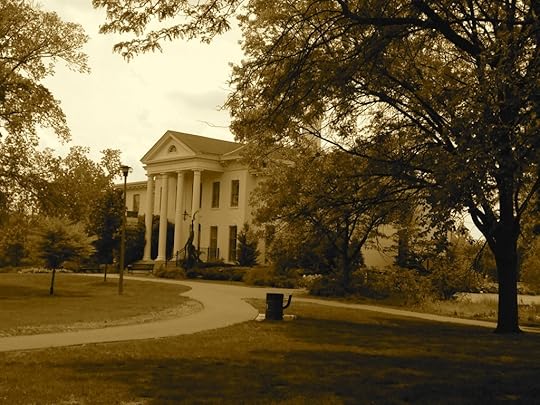
Last week, a friend sent me this quote: “We are all mystics. The trouble is, we usually miss the significance of the moment because we are not present. Mystics are those who notice–and then live their lives in the light of the glimpses of Oneness that, if we are attentive, are there for us all.” Dr. David G. Benner posted it on his Facebook page, apparently. It’s from his “book in process, provisionally entitled Human Being and Becoming.”
I love this quote for many reasons. But mostly for its inclusive definition “mystics.” Though few of us may identify as mystics, we indeed are all mystics–or we can be–if and when we notice God and when we seek to live “in the light of the glimpses” of God. (Isn’t that wonderful?)
So, today again, I was back to wondering why so many Christians fear the very word mysticism. When I asked this on Twitter, one woman wrote the word itself sounds “witch-crafty.” Which, of course, it does. Probably because mystic sounds, well, mysterious (mysterious and mystic are related, of course. Both meaning, root-wise, of things that are not seen [Greek] or that have hidden meaning [Latin]).
But that the word sounds creepy does not make it so. And just because something is creepy doesn’t mean it’s bad. Of course, I say this as one who loves all things creepy. Well, not old-man-riding-bikes-slowly-past-playgrounds creepy. But the bats-and-cobwebs, dim-lights-and-candles, wandering through an rambling dusty mansion sort. I don’t like witch-craft (remember: I love Jesus), but I do like mysteries. I like spooky stories. I like to jump out of my skin. I like to shiver–even when it’s warm out.
I’ve written before–and I’m sure I’ll write again–about how this love of mystery and creepy is actually what draws me to God. Because God, in his mystery, in his otherworldly-ness, in the ways he reaches into this universe and tingles our spines in his presence is kinda creepy. In a holy way. In a good way. God has redeemed my “love of the dark,” as my Enneagram type calls it, turned it into a holy quest for his presence in those dark and stormy spaces.
But of course not all Christians appreciate this connection–between a love of spooky and a love of Jesus. And I get that. There are lots of good reasons for this. So I also see how this disdain for the creepy makes people leery of mysticism in the Christian faith.
Which is why a broader definition of mysticism is necessary. It’s why I love Benner’s idea that we are mystics whenever we notice God. Pure and simple. If you’ve felt God in the hot summer sun, if you’ve heard his voice whisper through a lyric, if you’ve seen the love of Jesus in two once-enemies embracing or in your kids snuggling on the sofa, you’re a mystic.
And when we notice God at work, when we notice his voice or his scent or his touch or his presence, we’re invited to follow him, step deeper into the mystery of God. Into his good and wondrous (and only rarely, creepy*) glory.
*Don’t freak out. The Bible will back me up on these creepy-glory stories.
P.S. Another person responded to my twonder with her frustration over people “hearing” God tell them to cheat on their spouse or something. In another post, let’s talk about discernment and mysticism… And then maybe I’ll move on to another topic…
May 22, 2014
The Sudden Intrusion: A Bit of Ecstasy

On Monday, in my Reformed defense of mysticism, I write that to Reformed is to be mystic. That is, if we actually notice God in every “square inch” of his world. If we call God drawing us to him with his irresistible grace what it is: ecstasy itself.
Today, I offer an excerpt from Broke, a moment when ecstasy or the “sudden intrusion of the divine into the ordinary” happened to me.
As Fredrik tugged at the heavy, wooden doors to the lodge’s basement, I ran my hands along the stone foundation walls. When one window shutter proved unlocked and loose, we peeked in, hoping to find ancient paddleboats and oars, rotting picnic tables and benches. Instead, we peered in at a room filled with stacked conference-room chairs. We laughed about our find and pressed on. While holding Fredrik’s hand as he climbed up and along the stone walls, I wondered aloud what made the place so magical.
“It’s magic here?” Fredrik asked.
“Not really. Just feels special, I mean.”
“Like Door County.”
“Good call,” I said, as Fredrik grabbed my hand tighter and jumped off the wall so we could watch the fishing couple catch, wrangle and release a frog from their line.
And it was a good call. That was exactly why, I realized, this stone building in this bit of woods along a river-like creek in the near-west suburbs of Chicago dazzled me every time I was here. It was like Door County, Wisconsin. Specifically, like the wood-and- stone cottages and the stone walls that wound along roads in Door County’s Peninsula State Park, my favorite place on earth.
I slapped my hands on my thighs, “Ready to go, bud?”
“Nope.”
Instead, my son pulled me back up the stone steps, round the bend and into the lodge to see the wooly mammoth skeleton once more. As he walked around the display, pointing at bones, asking which they were, I noticed something remarkable. Next to the skeleton was another, glass-encased display I had looked at a billion times—with pictures of those early canoeists and picnickers, of smiling men in striped bathing suits and women with parasols.
But this time, I read what I had not read before. This lodge, the veranda and the walls my son had just climbed on and jumped from had been built by Franklin Delano Roosevelt’s Depression-era Civilian Conservation Corps. As I read on, my mind tunneled a bit, zipped back to the previous summer, when I had read these same words, this same statement on a little roadside plaque in Peninsula State Park, the very one we’d just been talking about. This lodge, those lodges; this wall, those walls; these favorite places—300 miles apart—had been crafted during the same time, from the same government program, from the same types of men, desperate for work during a desperate time. Out of financial calamity had sprung two of my favorite places on earth. It was as though God wanted to remind me what he could do with hard times.
And now new words came into my mind—not words from the Psalms, as they had when we sat by the creek, but from the novel, Cutting for Stone, I’d recently read by Abraham Verghese: “If ecstasy meant the sudden intrusion of the sacred into the ordinary, then it had just happened to me.”
Maybe thirty minutes after being still and choosing to know that God is God, he intruded. And it was ecstasy, which I’ve known to be those brief moments when I’m so aware of God’s hand, so keen on his message, so moved or at ease or fired up in his presence that the world blurs away, and my mind and soul zero on in on the very face of Jesus. A sort of tunnel experience—me at one end, God at the other and light in between—and we zip together, ever closer. Until, that is, life snaps me back. As was the case here, when my son—who had moved on from the mammoth fossils— wanted company as he climbed the tight-winding steps to perch in a giant bird’s nest.
May 19, 2014
T.U.L.I.P Fueled Ecstasies & Other Reformed Defenses of Mysticism

I had hoped by now I’d be over my annoyance toward Tim Challies’ unfortunate post in which he calls St. Teresa of Avila a “false teacher.” Certainly it helped ease my frustration when my friend Ellen Painter Dollar wrote such a stellar response. But alas, the annoyance remains.
As troubled as I was over Challies’ brutal (and wrong) allegations about St. Teresa, something else has kept at me. The same thing, in fact, that gnaws any time any of the supposed Reformed crowd makes claims in the name of Reform-ed-ness that just don’t hold holy water. At least, not in the Reformed circles I run in (and I run in lots: I’ve been a member of a CRC church for 33+ years. I graduated from “Reformed-perspective” grade, middle and high schools and then Calvin College. I’m employed by my church and work for a RCA and and a CRC pastor).
So when Challies claims we cannot experience or know God outside of Scripture and expresses hostility toward not only St. Teresa but all mystics and mysticism, and when he does this in the name of Reformed theology, I gotta pipe up. I have to because I am Reformed–as dyed in the wool as I am washed in the Blood–and I am a mystic. Or, at least, mystically inclined.
So here it goes: while certainly St. Teresa got plenty wrong–we all do–she was no false teacher. St. Teresa’s personal experiences and sweet communion with Christ are enviable. Especially to a mystically-minded Christian like me. Reading her words will not put us on the path to hell, as the term “false teacher” implies. But Challies’ assertion that we cannot experience or know God outside of Scripture or in ways “not found in Scripture” might very well put us on that path. At least, it could’ve with me.
I would not be a Christian if I hadn’t felt God first, if I hadn’t been convinced at seven years old that God heard me, “the little one, cowering the middle,” as I write in Broke. Without hearing, seeing, tasting, seeing, feeling God through nature, without sensing God’s hands somehow reach through the universe into this created world, put his hands on my face, and draw me toward him, I don’t know that’d I have bothered getting to know God more through the Bible.
This is not false teaching or false learning. This is not narcissism or heresy. This is Reformed Doctrine. The Belgic Confession says we know God first
“…by the creation, preservation, and government
of the universe,
since that universe is before our eyes
like a beautiful book
in which all creatures,
great and small,
are as letters
to make us ponder
the invisible things of God:
God’s eternal power and divinity,
as the apostle Paul says in Romans 1:20.
All these things are enough to convict humans
and to leave them without excuse.”
We know God second, the Belgic Confession says, through the Bible. What we Reformed folks profess is exactly opposite of what the “Reformed” Challies claims.
Beyond that, there’s the granddaddy of Reform-ed-ness, Abraham Kuyper, who famously said: “There is not a square inch in the whole domain of our human existence over which Christ, who is Sovereign over all, does not cry, Mine!”
This idea that Christ claims every bit of this earth is central to Reformed worldview. It fuels our belief that our work (and play and creativity and sleep and … and…) can be worship, that there is no “sacred” and “secular” divide, and that God can be known–that he reveals himself–through every square inch of this earth. It’s why I have no problem hearing God “speak” through a passage in Mrs. Dalloway or Glittering Images or why I feel his presence wandering past the masters in the Art Institute of Chicago. It’s God’s. He uses it. All.
That Jesus claims every square inch of this earth is a reminder that his Spirit and his people are at work in this world, that his kingdom is come. And that we can know Jesus, experience God through it. In ways that may or may not be modeled in Scripture. I mean, I’ll check, but last I looked not one prophet managed to hit up the Art Institute. Does this mean God doesn’t speak there?
And then there is our oft-mocked T.U.L.I.P (which has been redone as F.A.I.T.H., and I just heard B.A.C.O.N). That we Reformed folks believe grace is irresistible (“I”) even in our total depravity (“T”) is nothing short of a mystical act. In fact, that moment we steeped-in-sin, broken people first feel the pull from God on high toward his all-wrapping, all-consuming grace and mercy and love is–or should be–ecstasy itself.
There’s no way around this. To be Reformed is to hold a high view of Scripture, yes, but also to understand that this world–every last square inch of it–is the Lord’s and that he’s at work in it, through us, through creation, through the created. And this means we encounter God, hear God, see God, smell God, taste God, feel God in the most dazzling, awesome, mystical ways.
Now that I’ve written this, I’m no longer annoyed at Challies. But I’m sad for him and all that he’s missing. I’m sad for anyone who misses out on experiencing God through his Spirit, through General Revelation, who doesn’t feel a sweet, personal communion with Jesus. I pray that God opens those hearts and minds and eyes and ears and taste buds and nostrils and that God sloughs callouses from feelers so that all those who’ve only gotten to know God through the Bible may answer his call to get to know him in the whispers of our heart and in the broader world as well.
Note: In many ways, my new book Broke was my mystical coming out. In a subsequent post, I’ll share an ecstatic excerpt.
May 13, 2014
“What I Learned About Being Wealthy By Going Broke”
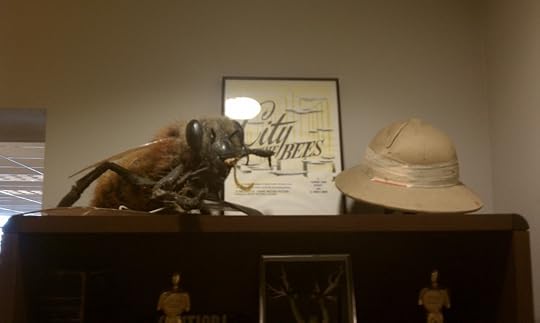
Once upon a time I was wealthy. Not just American-style wealthy. Wealthy wealthy. Maybe not the top of the 1%, but still: the sort where a brand-new car awaits you on your 16th birthday, a gold watch congratulates your high school graduation, and a long, creamy strand of pearls commemorate your college. The sort of wealthy with weddings held in swanky ballrooms on Chicago’s Gold Coast and honeymoons taken in ritzy resorts.
Even during the lean-ish early-married years, we never worried about bills – another form of wealthy. We took lovely trips, saved for down payments. Though my career as a magazine editor and freelance writer never gave much hope for financial prosperity, the promise of wealth from my husband’s booming business kept us feeling blessed beyond measure.
Certainly, blessed is what our churches and our faith traditions led us to believe we were.
What I didn’t know then — but what I do know now — is how wrong I was.
To continue reading at OnFaith, click here.
May 10, 2014
Remember Well
“Remember well.” So reads the inscription in my copy of Everything That Makes You Mom, a lovely little book of vignettes and memory-prompts about mothers. Remember well is good instruction when it comes to our moms, of course. It’s important that we remember the acts of love, the reasons for discipline, the sounds of laughter, the endless work, the whatevers of what our mothers did for us.
But Remember Well is an important, well, reminder in our faith life as well.
God tells the Israelites again and again to remember. It’s a spiritual practice really. Remember what God has done, especially during the times when he seems far, when he seems absent, when his hands seem off the wheel. We remember what God has to help hold to the promise of what he will do (and is doing).
And so Laura Lynn Brown invites readers to do this for moms–whether your mom is still with you or if she died years ago. “Take time to wander through the gardens and greenhouses and fields and abandoned lots of memory,” she writes.
I hope you do.
May 2, 2014
“Searching for the Sound of Silence”

This article appears in full at Her.meneutics:
A recent Thought Catalog article dished out some research about writers. They’re depressed people, awful lovers, overly thinky, and largely unhappy.
As a writer, I should recoil at these words. I should get nervous about statements like:
Writers think a lot and people who think a lot tend to be unhappy. Add to that long periods of isolation and the high levels of narcissism that draws someone to a career like writing, and it seems obvious why they might not be the happiest bunch.
But alas, I know it’s true.
I think a lot and sway unhappy, so this characterization of writers actually comforts me. Finally, some reasoning behind my abhorrence for those spiritual disciplines so many writerly thinkerly types love: the hush-hush of silence and solitary prayer and activities like quiet walks through empty canyons…
To continue reading, click here.
April 14, 2014
Holy Week Confessions
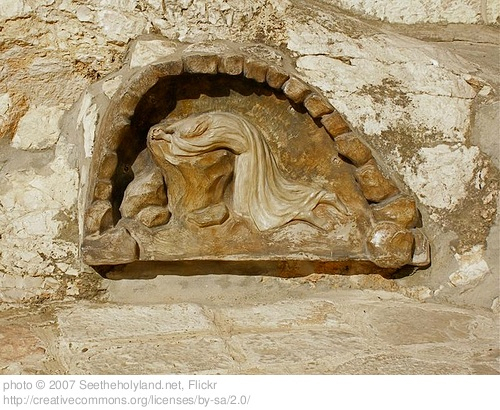
So God:
We’re in the Lenten home stretch and now I’m looking back at this practice–kind of sick of it, kind of tired–wondering, hoping it was even okay to do. It’s been good: exploring the sins of my soul. But also as an exercise in what I will share in writing (in the moment) and what I won’t. Because although I’ve taken some sins–broad, wide–public, I’ve shared lots just in private. Some not even thought. Just sort of groaned. Either way, thank you for forgiving me. For your grace.
But it’s not been “fun,” the way I describe the confessional practice in Broke. When my kids and I write 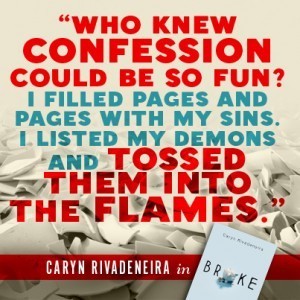 our sins on paper and toss them into the fireplace flames, when we smirk at the thought of parishioners wearing the ashes of our sins, striped and smudged in a cross on their foreheads.
our sins on paper and toss them into the fireplace flames, when we smirk at the thought of parishioners wearing the ashes of our sins, striped and smudged in a cross on their foreheads.
And yet, it’s been good.
Anyway, today, forgive me for my environmental sins. So, so many here. But today I’m thinking of the waste. Forgive me for being too lazy to run back in the house and grab my reusable bags, thinking it’s “no big deal” to get plastic ones just this one time. Forgive me for the waste in products and packaging, for my over-consumption. Forgive me for driving when I could walk, for not remembering all I needed and having to drive back.
Amen for now… I think I’ll just add my other confessions right into this space….
April 12, 2014
My Lenten Confessional: Day 33-34

So God:
I missed yesterday. If this were a command–not a practice–I’d confess it. But wagons are made to be fallen off of. And today, I’ve got about 5 seconds to do this. And I’m feeling super grateful right now–for so much. For this moment of quiet I’ve snuck in at the Festival of Faith and Writing, for the conversation with a former professor, for the students playing and singing in the room to my left. As she’s singing, “You are amazing, God.”
So, just forgive me. For the stuff you know. Because here comes another friend….
Amen
April 10, 2014
My Lenten Confessional: Day 32 (Pride)
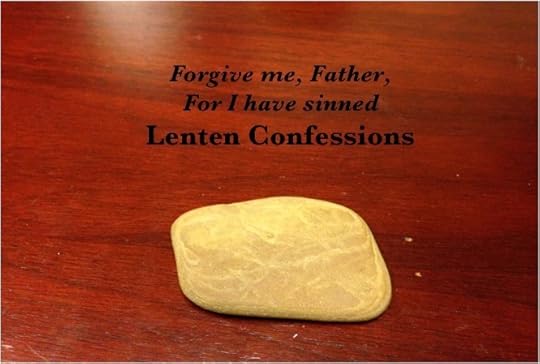
So God, today’s sin is Pride. And feel pretty good about this. Was just thinking about “good” I am at revealing my foibles and indiscretions, for the most part. Not afraid to take a fall for the sake of a good story or for the sake of people not feeling “alone.” It’s why I’m excited (forgive me for the plug) about the panel on vulnerability I’m part of at Festival of Faith and Writing tomorrow (which starts today, which I’m bursting at the seams excited about1).
And of course, I’m proud of all this. Quite so. So, yes. Forgive me.
Amen.
Click here for the other confessions and click here for the reason I’m even doing this.





